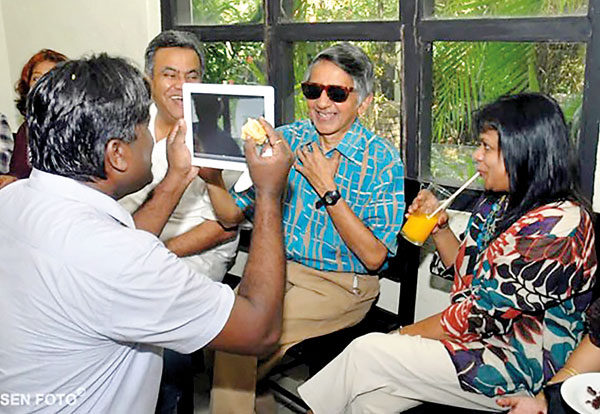Sunday Times 2
Farewell, brother; your reach was well beyond the senses
View(s):By Lawrence Heyn in Brisbane
Everyone who came in contact with Louis Benedict was touched by his gentleness, empathy and bright smile that made you feel special.
I met Louis more than 50 years ago in the bustling SUN newsroom, a few floors up in the Dawasa building off Mihindu Mawatha in Hulftsdorp. Louis exuded calmness as he extended a hand and smilingly greeted me as a brother.
I was soon to learn that Louis addressed mostly everyone as brother. That was who Louis was—willing to accept everyone at his level, on their merits and without any judgement. He was the calming influence in a high-pressure newsroom, where reporters were stressed to produce their copy for rolling deadlines. In the many years that I worked with Louis, I can’t remember a single time when he was flustered or became angry. He was the beacon to head to when the literary seas turned choppy.

Louis in blue shirt and shades enjoying a joke with his journalist colleauges at a get-together
Louis was one of a kind. He was an accomplished wordsmith, a highly skilled editor and, most importantly, he was a shining example of how you can triumph over adversity.
Louis’ passing on Tuesday, April 22, was a sad day for the many hundreds who knew him through the years. His was a many-storied life, and he had a few winding roads to travel, but he did so always with a positive frame of mind. He reached the pinnacle of his career as Deputy Editor of the Sunday Times, and what was remarkable was that Louis was severely vision impaired, a drawback that would have tested less-resilient people.
Louis took a leap of faith and placed his trust in his Sunday Times colleagues, crediting Ameen Izzadeen in particular for giving him the support to fulfil his editing role. Louis had unmatched skills as a sub-editor, and for the past two decades he had become a role model for aspiring journalists. In his own words, Louis said his whole vision and goals in journalism had changed.
In a Sunday Times profile, he said he wanted to “be the voice of the voiceless people, to spotlight their grievances.” He was so positive about his loss of vision that he found it was not a problem for him. He was focused on social justice, saying his faith helped him see the problems of the world more clearly.
Back more than five decades ago, Louis was always there to give me a leg up in my fledgling career. He was always thoughtful with his advice and helped me see story “angles” more clearly. After covering a sporting event and panting up three flights of stairs to the newsroom, I would seek out Louis to discuss how I would write my match report. He always showed interest and offered wise counsel when writer’s block set in.
Louis was a mentor to a myriad young journalists. His advice was never wasted and always came with the bonus smile.
Louis was more than a colleague. He could be quite the entertainer and freely joined in the fun. He could tell a good joke and had an infectious laugh, but it was never at anyone’s expense.
During late-night shifts, we would take the short walk up the hill to the now long-defunct Iqbal’s café for their signature rice and curry. Or we would head to a pub–the Crown, I think–to share a Lion Lager and quick bites. Once the final edition of the SUN was put to bed, we would pile into the company car to be driven home but not before stopping at the Mayfair restaurant for a hot kottu roti. This would often be around 1.30am.
We were more than colleagues; we were a special kind of family. A family I sadly left behind when I migrated to Australia in 1984.
Even 50 years ago, Louis’ eyesight was failing. If we were walking together somewhere, he would gently reach out to hold on to another’s shoulder as a crutch to steady him. We did not mind, as he was our brother.
Rest in peace, dear Louis.

